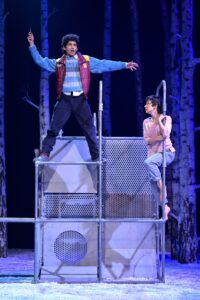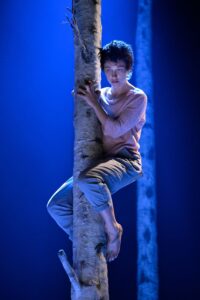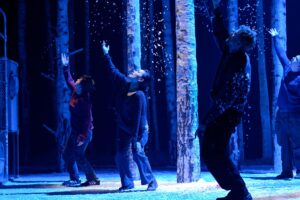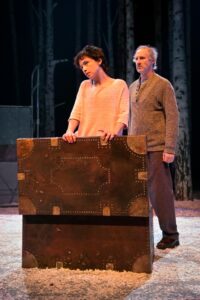Let the Right One In
Jack Thorne, Stage Adaptation
Based on the Novel & Film by John Ajvide Lindquist
Berkeley Repertory Theatre
(Presenting The National Theatre of Scotland Production)

Two kids meet at night in the courtyard between their families’ two flats and quickly become friends. One is a boy; the other appears as a girl but says is not. One is twelve; the other looks twelve but is not. One is bullied; the other appears to have no fears. One loves sweets, especially foam bananas from the local candy store; the other’s only sustenance to survive is the blood of others. One sleeps in a bed; the other, in a wooden trunk.
Their friendship is turning into first love for one; for the other, a next love in what is likely a long line of past loves.
While wildly popular in novels, TV, and the big screen, rarely does a story about a vampire or anything touching the genre of horror appear on live stage. But one such widely acclaimed story first appearing in a 2004, Swedish novel by John Ajvide Lindquist and then produced in two subsequent films now lands in all its bloody glory on the stage of Berkeley Repertory Theatre in a production by the revered National Theatre of Scotland. Adapted to the stage by Jack Thorne, Let the Right One In indeed has a prevalent thread of creepiness with an ongoing threat of sudden surprise; and there are the required bloody murders and some big bites into necks for blood. However, Let the Right One is also a beautifully conceived story of unconditional friendship that unfolds much like a sensitively choreographed ballet that is scored by mesmerizing music, a story guaranteed to touch heartstrings and to leave audience members smiling and uplifted.
Bushy-haired Oskar is a meek, bookish pre-teen who tries to mind his own business but is constantly teased by bullies at school. He endures ambushes in the locker room by guys much bigger and tougher than he, repeatedly called “Piggy” and forced to squeal like a pig or be beat up. Things at home sometimes are not much better. His parents are divorced, with his alcoholic mom alternating between cuddling and bantering him and his absent, gay dad showing not much interest in being around him save an occasional hour or so of playing checkers.

One night while hanging out on the play structure of the courtyard in his apartment complex, Oskar meets Eli, another rather quiet kid who has moved in next door with an older man Oskar assumes is Eli’s dad (having heard the two loudly arguing at night through the adjoining wall of their apartments). Oskar watches Eli with silent fascination. Eli tends to move a little strangely (e.g., head cocks and extends outwards and then quickly jerks and twists a bit), and Eli can ascend or descend the gym set much like a leaping cat. The two have an immediate curiosity about the other, with Oskar particularly wondering about but not being particularly bothered about the strange, wet-dog smell coming from Eli. Oskar also notes to Eli more than once, “You sound like an old person,” but they both just shrug off the remark. Things are looking pretty good that this new kid in the complex could be a pal for Oskar; but Eli abruptly announces, “I can’t be friends with you, just so you know; that’s how it is.”
But the two continue to meet about the same time each night on the courtyard’s kid’s gym set. When Eli sees that Oskar has a bruised eye and learns it came from boys at school, Eli tells him, “You need to strike back … Hit hard … Use weapons;” he also promises to help him. Oskar gives a sheet of Morse Code instructions to Eli, and they begin sending messages at night through their rooms’ adjoining walls. The friendship quickly grows into something more for both, even after Eli warns Oskar not to be fooled by an appearance as a tom-boyish girl.

Oskar’s ongoing threats by bullies is not the only thing he and all those in his town must be concerned. On the TV, there are warnings about horrific murders occurring in the nearby, popular woods at night, killings where throats have been slit and blood drained. In the midst of a snowy winter, something scary is looming over the town while at the same time, Oskar is continually on the lookout for the next, brutal attack by his unrelenting bullies.

Diego Lucano and Noah Lamanna are each stunningly brilliant in their performances of Oskar and Eli, respectively. Their dialogs are the kind of natural, matter-of-fact things any twelve-year-olds might say to each other; but the real beauty comes in the pauses, the silences of just being and playing together. Back-and-forth questions of “OK?” and answers of “OK” become ways to check to see if the other is in fact comfortable with the next step in their progressing relationship. As they teeter between two kids as neighborhood pals just hanging out and two now having arousing desires to kiss and maybe more, theirs is a relationship affectionally and believably portrayed even as we as audience realize with some trepidation that one of them is not at all what the other thinks.
Diego Lucano’s portrayal of Oskar makes one want to reach out and hug him and tell him – as does his encouraging and sympathetic gym teacher, Mr. Avila (Julius Thomas III) – hang in, get through this rough time because “it gets easier.” For anyone who was ever been bullied in any way, it is nothing less than painful to watch how his Oskar garners the courage but then experiences the humiliation to endure mocking taunts and teases, sand pushed into his mouth, or threats made to stab out an eye. We also silently cheer as Oskar makes believe he is a knight with a mighty sword, fighting back against his enemies as he repeatedly stabs a tree and kicks with the skills of a judo master.

As the two-hundred-year-old vampire Eli who presents self as a twelve-year-old girl, Noah Lamanna (who uses the pronouns they/them) is phenomenal. In just how they move, one imagines sometimes the likened movements of a praying mantis insect and at other times, of a stalking feline. Eli displays aspects of both a kid and an ancient in the expressions of eyes that sparkle one minute with youthful excitement and that darkly deepen in another with knowledge coming from past experiences unspoken. When Eli’s vampire self suddenly appears, there is a transformation quite terrifying; when Eli’s heart allows itself to feel love, there is tenderness palpably projected.

Many spontaneous moments of being playful kids as well as the slowly enveloping moments of deepening feelings that define Oskar and Eli’s times together are expressed not in words but in movements – just part of the overall, ever-present choreographic staging that Director John Tiffany and Associate and Movement Director Steven Hoggett have uniquely designed for this production. Various members of this cast of seven are often in the shadows of a scene employing beautiful, powerful movements to illustrate unsaid emotions, to duplicate another’s current action, or to highlight the contrasting states of loneliness or fear. Sometimes there is a feeling of modern dance, sometimes of ballet, and sometimes of just well-done mime. As is much of the play, all is accompanied by the multi-instrumentalist music of Olafur Arnalds and Arnór Dan Arnarson that ranges from background ambient to atmospheric pop, often rising in volume and intensity through Gareth Fry’s impressively expressed sound design to capture the emotions, conflicts, or even horror of the present scene. Along with the spellbinding and scene-defining lighting effects of Chahine Yavroyan amidst the snowy, aspen forest set designed by Christine Jones, the total effects are often dream-like as Director Tiffany blends scenes one into the other with captivating movements dancing across the stage as scenes make definite shifts.
Winter becomes all the more real as part of Aileen Sherry’s costume designs while horror has its own starring moments through the eye-popping, chilling, and often not-to-be-believed special effects designed by Jeremy Chernick.

While most of the stage time focuses on Eli and Oskar, a talented cast adds in details that explain further who they are and why they are as they are. Nicole Shalhoub is Oskar’s loving and protective Mom who has her own shifts to near-monster when under the influence of her alcohol addiction. Among several other roles, Erik Hellman plays his Dad whose anger can quickly explode if his son wants much more of him than a quick visit. Richard Topol is Eli’s long-term, devoted companion, Hakan, whose love leads him into desperate and despicable acts. Along with his role as Oskar’s gym teacher with big heart and special devotion to his timid, bullied student, Julius Thomas III is Halmberg, the nightly news harbinger of the deadly terror that lurks in the town’s forest. Each taking on a number of roles, Jack Difalco, Jon Demegillo, and Michael Johnston will long be remembered by the audience as the faces of Oskar’s vicious, viperous bullies.
Not being a fan of horror books or movies, I must admit I attended the opening night of Berkeley Rep’s Let the Right One In mostly out of obligation as a critic and because I have the highest regard of both the Rep and of The National Theatre of Scotland, whose productions I have seen on several visits to Edinburgh. However, I will heartily admit that I found every minute of the one hundred, twenty to be quite captivating due to Jack Thorne’s economically worded script along with John Tiffany and Steven Hoggett’s masterful and magical co-direction of the cast’s accomplished acting and their dance-like movements.
Rating: 4.5 E
A Theatre Eddys Best Bet Production
Let the Right One In continues through June 25, 2023, in a National Theatre of Scotland production by Berkeley Repertory Theatre in the Roda Theatre, 2015 Addison Street, Berkeley, CA. Tickets are available online at https://www.berkeleyrep.org or by phone (510-647-2949) or in person at the box office Tuesday – Sunday, noon – 7 p.m.
Please note: Masks are required of all patrons in the theatre.
Photo Credits: Kevin Berne

Leave a Reply